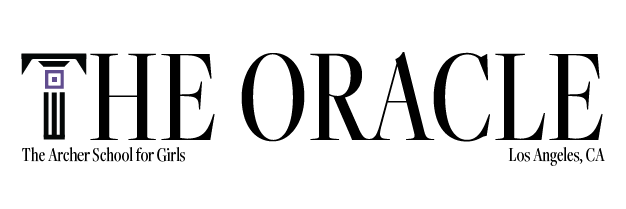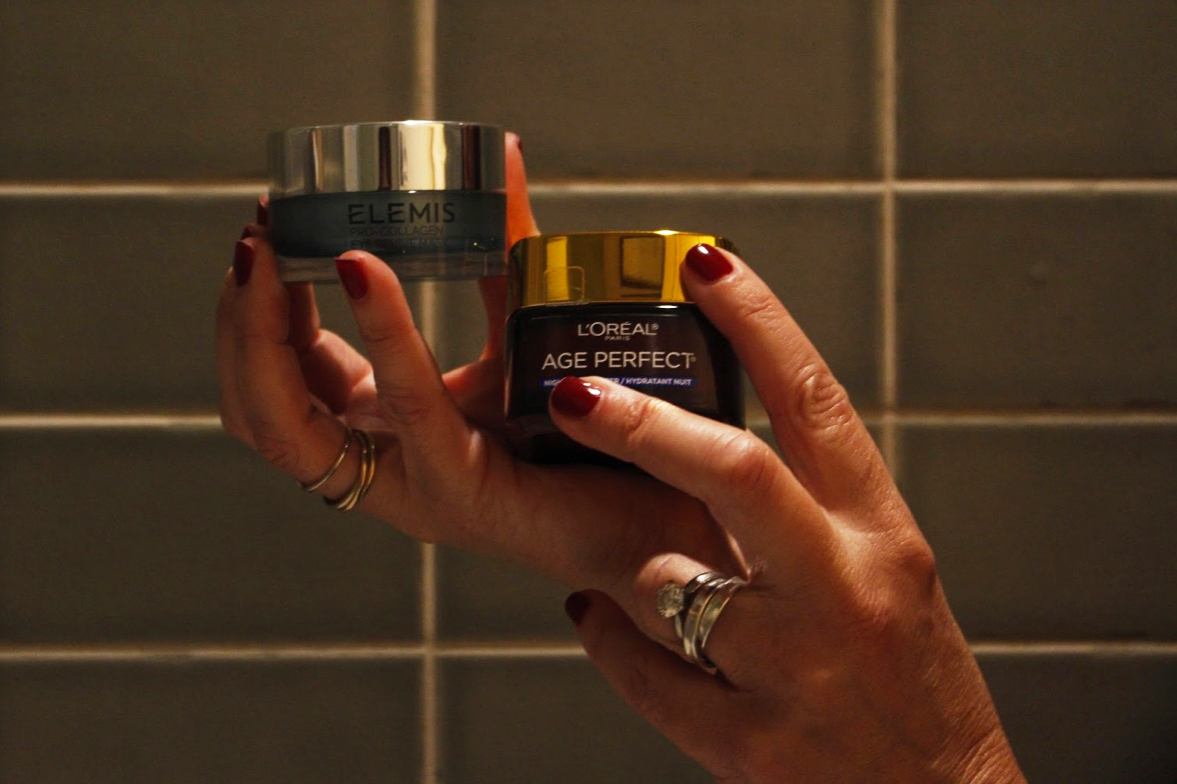Social media perpetuates beauty industry’s focus on anti-aging, has potentially ‘harmful’ impact
April 27, 2023
A contorted, horizontally-oriented straw engineered to combat wrinkles surrounding the mouth. Medical grade tape applied to the back of the neck for a homemade facelift. A shampoo formulated to prevent gray hair, which is advertised with the phrase, “Not today, grey.”
Each of these products has had its moment under social media’s spotlight of viral status — and atop the bathroom countertops of those influenced to purchase them. A 17-second-long TikTok video of the straw surpassed 3.2 million views. Another brief video displaying the instant, face-lifting effects of the tape garnered 8.4 million likes on TikTok. Vogue Magazine deemed the shampoo “the best” for graying hair.
What else do these trendsetting products have in common? Each is advertised with the promise of enhancing one’s appearance and outsmarting the natural aging process.
Anti-Aging and Social Media
In an era of global social media usage, beauty-enhancing products have found their way into the TikTok “For You” pages and Instagram feeds of many users. According to a 2020 study, “72% of millennials procure beauty products based on Instagram posts and other social networks.”
Sophomore Sofia Cianciolo said the reactions and comments on posts promoting age-preventing products and hacks she observes across social media platforms is “concerning.” Cianciolo added she has experimented with skincare products that also include anti-aging benefits but worries about the harmful impact anti-aging products have on women.
“I think that social media further perpetuates and influences this narrative that [women] need to look younger or be a certain way appearance wise,” Cianciolo said. “You’re always striving to be younger even when you are young. It further spreads and influences young people to believe that anti-aging is the only solution to issues they may be experiencing mentally.”
Similar to Cianciolo, science teacher Larisa Carter said she has noticed an uptick in content portraying unattainable beauty standards and elaborate methods of outwitting the aging process. However, Carter made the distinction between the posts she views on Reddit, which offer a communal space for swapping helpful beauty tricks and tips, and the videos she consumes via TikTok, which she said are filtered and unrealistic.
“It just isn’t the reality of the person,” Carter said. “In the real world, if I look in the mirror, it’s never going to look like a TikTok.”
Double Standards in Gender
Social media is, arguably, a fundamental component of day-to-day life for many, whether it be for entertainment, informative or content-creating purposes. According to a 2021 survey conducted by the Pew Research Center, over 70% of adults in the United States said they use at least one social media platform on a daily basis.
However, women and men are treated differently in digital settings, such as social media.
A 2015 study found that women receive more backlash for posting similar or the exact same posts as men, and that men are more likely to utilize authoritative or possessive language when interacting with posts. Yet, women receive hate and negativity when their comments and captions are not laden with exclamation points and emojis. According to Rebecca David, a dermatology physician assistant in Los Angeles, gender-based double standards extend beyond social media interactions and bleed into many aspects of women’s lives, especially in respect to beauty-related expectations.
David specializes in cosmetic and medical dermatology, and around 75% of her patients of all ages identify as female. According to David, social media sustains the ideology that the younger a woman is, the more beautiful she is. David said this is not the case for men.
“Society equates feminine beauty with youth. It is engrained in our brains as children through marketing that young women are [more] beautiful,” David wrote in an email. “Media teaches us that wrinkles, fine lines and sagging skin are unattractive instead of natural aging. I feel that men, on the other hand, have less societal pressures.”
Similarly to David, Carter said she feels social media heightens the pressure put on women to appear more beautiful and the emphasis of age-prevention in media targeted at those who identify as female.
“For women, it’s too much. It seems like in the pictures of women that I see, most of them are young or are filtered to look young,” Carter said. “Whereas, for men, it seems more acceptable to be a variety of ages and to have wrinkles and gray hair.”
Listen to the below audio clip to hear Sofia Cianciolo discuss the beauty-centric double standards women face in comparison to their male counterparts.
Younger Generations
As popular as social media is with older generations, it’s popularity with younger generations is even greater. In 2018, a study conducted by Hopelab and Well Being Trust gathered 93% of youth ages 14-22 use social media on a daily basis. However, especially for younger users, social media’s influence is not limited to the digital world, and has the potential to extend beyond the screen and into their lives.
Seventh grader Tea Walker said they view primarily makeup and beauty-related content. They said though the beauty content they consume is primarily artistic and creative, they see plenty of appearance-enhancing posts on their Instagram and TikTok feeds.
“[Those posts] can change your mental state for the worse and really impact the way you see yourself,” Walker said. “It could also make another generation of people who are fearful of aging.”
Additionally, Walker said the emphasis the beauty industry places on improving appearance and suspending the process of aging is “extreme,” and embracing one’s natural features is a better solution than attempting to conceal them.
“I believe [the beauty industry] puts too much emphasis on enhancing one’s appearance and aging,” Walker said. “I think makeup should be used for art and not for appearance.”
Similar to Walker, sixth grader Carmen Muñoz Graham said though she is not present on social media, she thinks the beauty industry puts a significant emphasis on preventing aging and preys on the insecurities of aging people in the name of grossing mass amounts of profit. Muñoz Graham also said she avoids worrying about aging herself, and she views the aging process as natural and a fundamental facet of being human.
“It’s natural. There’s no reason to be afraid of it,” Muñoz Graham said. “Everyone has it, and I think if beauty industries keep selling anti-aging products, everyone [will become] afraid of getting older, even though it just happens to everyone.”
Impact of Anti-Aging Promotion
Many anti-aging and beauty-enhancing products are showcased in clickbait-inducing posts, promising to terminate wrinkles, to plump the lips or to simply “say no” to gray hairs. According to dermatology physician assistant David, though these posts can simply be scrolled past on one’s device screen or ignored entirely, their lasting impact cannot be outrun.
“Social media, like all media, glamorizes youth,” David wrote. “We have so many influencers in their teens and 20s having cosmetic procedures and further perpetuating unrealistic beauty standards. Additionally, social media has filters, bringing more unrealistic standards to women as they age.”
David added she herself practices “aging gracefully,” which is the ideology of embracing one’s age and its effects, while also prioritizing health and certain minimalistic cosmetic changes such as dying one’s hair. But, she wrote, the impact of anti-aging differs from person to person, and in her case, from patient to patient.
“It is very important for me to come into each appointment open minded and ready to listen to my individual patient’s questions and concerns,” David wrote. “I have some patients who want to aggressively pursue anti-aging options — and I am there to support them — and many who have no desire to discuss aging.”
Hope for Future
Cianciolo said she hopes that the stigma surrounding aging and its effects will decrease steadily. She added that, going forward, she would like to see an increase in people embracing their natural features rather than attempting to outwit the aging process.
“My hope is that people don’t feel the need to do all these different things to make them appear younger,” Cianciolo said. “[Its good] if they want to fix them in order to genuinely feel more comfortable, but not to do it because other people are doing it.”
Walker said the stigma surrounding aging is “too much,” and, like Cianciolo, they too hope to see a decrease in age-preventative trends and posts circulating social media in the future. They said there is certainly a potential for this solution to come to fruition, but these changes will not occur overnight.
“I think that [the stigma] could go away. But I believe that right now, it’s not going to go away,” Walker said. “We need other people on the other side counterbalancing that and telling you you’re beautiful no matter what you look like.”


